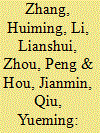|
|
|
Sort Order |
|
|
|
Items / Page
|
|
|
|
|
|
|
| Srl | Item |
| 1 |
ID:
119810


|
|
|
|
|
| Publication |
2013.
|
| Summary/Abstract |
This paper presents an assessment of the productive efficiency of an advanced biodiesel plant in Japan using Data Envelopment Analysis (DEA). The empirical analysis uses monthly input data (waste cooking oil, methanol, potassium hydroxide, power consumption, and the truck diesel fuel used for the procurement of waste cooking oil) and output data (biodiesel) of a biodiesel fuel plant for August 2008-July 2010. The results of this study show that the production activity with the lowest cost on the biodiesel production possibility frontier occurred in March 2010 (production activity used 1.41 kL of waste cooking oil, 0.18 kL of MeOH, 16.33 kg of KOH, and 5.45 kW h of power), and the unit production cost in that month was 18,517 yen/kL. Comparing this efficient production cost to the mean unit production cost on the production possibility frontier at 19,712 yen/kL, revealed that the cost of producing 1 kL of biodiesel could be reduced by as much as 1195 yen. We also find that the efficiency improvement will contribute to decreasing the cost ratio (cost per sale) of the biodiesel production by approximately 1% during the study period (24 months) between August 2008 and July 2010.
|
|
|
|
|
|
|
|
|
|
|
|
|
|
|
|
| 2 |
ID:
127227


|
|
|
|
|
| Publication |
2014.
|
| Summary/Abstract |
Many countries are concerned with the waste-to-energy for economic development and societal welfare. This paper constructs a dynamic game model that, for the first time compares the incentive effects of four common subsidy modes on waste cooking oil supply for biofuel refining and sales of waste cooking oil refined products. The model considers the impact of preferential tax treatment, a raw material subsidy, a sales subsidy and an investment subsidy on the profits of biofuel enterprises and waste cooking oil recyclers. Results indicate that common approaches adopted in developed economies such as raw material price subsidies and finished products sales subsidies increase the profits of both biofuel enterprises and recyclers. On the contrary, investment subsidies, which are relatively common in some regions of China, increase the profits of recyclers, while reducing revenues achieved by biofuel enterprises. To promote the supply chain, policy should give priority to raw material price subsidies and finished products sales subsidies, and for investment subsidies, however, the government should be cautious.
|
|
|
|
|
|
|
|
|
|
|
|
|
|
|
|
|
|
|
|
|